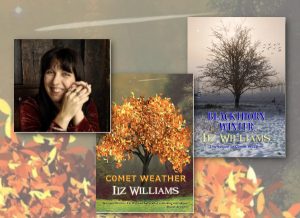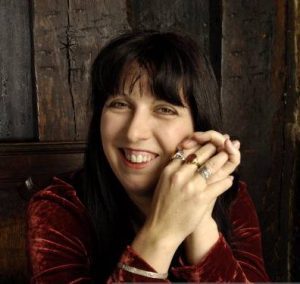Interview with Liz Williams (COMET WEATHER)
(Photo by Rob Scott/SFX magazine via Getty Images)
Liz Williams is the author of the wonderful Comet Weather (2020), a book about four fey sisters living in Somerset. The sequel, Blackthorn Winter, is due to be released in January 2021. Her debut novel The Ghost Sister (2001) is an impressive work of science fiction that explores ideas around gender and disability that was nominated for the Philip K. Dick Award. Since then she has written a wide range of imaginative and powerful works of SF and Fantasy. The Empire of Bones (2002) and Banner of Souls (2004) were also nominated for the Philip K. Dick Award, and the latter was shortlisted for the Arthur C. Clarke Award. Williams has also written non-fiction, including the two volumes of Diary of a Witchcraft Shop (2011-2013) with her partner Trevor Jones, and Miracles of Our Own Making: A History of Paganism (2020). Liz Williams was kind enough to speak to The Fantasy Hive over Skype.
Your latest book Comet Weather is out now from Newcon Press, would you be able to tell us a little bit about it?
Yes, it’s set in Somerset, which is actually where I’m sitting right now, I live in Somerset. This is the first time that I’ve really written anything novel length that’s been set in my home county, if you like. I did it because I started wanting to write about where I physically was, and using more of the folklore and legend around here. I’m actually in Glastonbury, which obviously is a big center of Arthurian legend and lore and so on. I didn’t really want to do that because I felt that had been done a lot already. What I wanted to focus on was some of the less discovered folklore of the South of England, from London to Sussex, where some of the next book is going to be set, Suffolk, Somerset itself, Cornwall — and get away from the kind of Celtic theme that a lot of fantasy has. There’s nothing wrong with that. I myself am from a Welsh and Scots background, I love all that stuff. But I do feel that it’s been done to death a bit. But that’s where it came from. And I wanted to write about houses and families and magic and all sorts of different things. Shape shifting.
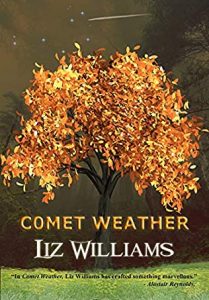 And that particular type of mythology is a big strain running throughout the novel. Was this something that you were familiar with beforehand? Or did it require lots of research?
And that particular type of mythology is a big strain running throughout the novel. Was this something that you were familiar with beforehand? Or did it require lots of research?
No, it was something that I would have been pretty familiar with. I’m a pagan. I and my partner, until just before lockdown came on, ran a witchcraft shop in Glastonbury. So we’re really familiar with all of this stuff. But there’s a lot of British magic that hasn’t been really explored very thoroughly in fiction. And I think one of those elements is the Behenian stars, the planetary spirits of the fixed stars that are always in orbit above us. I just wanted to do something with that. I wanted to do something with Renaissance magic and Elizabethan magic, and just make it a little bit different. There’s a lot of traditional stuff like brownies, and house spirits and so on, that has been done, in Harry Potter, among others. There’s nothing wrong with that. But I wanted to get away from that. There’s so much there. British folklore is absolutely vast, and there’s so much potential in it. So I wanted to explore that, basically.
One of the things I really loved about the book is how the fantastical elements run along in the background, it’s there all the time but hidden whilst people are living their normal everyday lives…
Yes, I wanted to get away from the trope of it being completely hidden. The characters take it pretty much for granted, and I liked the idea. I always like the idea that there’s something going on that one person doesn’t know about, and what happens if they discover it. That would be Nel in the novel, but I wanted her to have her own agenda. She actually knows everything that’s going on there. She’s totally aware. But she doesn’t say anything, because she feels that it’s not her business. And she wants the family to get on with it for themselves. She’s got her own plan, and she’s sticking to that. So I wanted to play with those tropes a little bit, of the magic being something that everybody takes for granted. To the extent they might not even mention it, because it’s so obvious.
Another big part of the novel is the family relationship aspect — you have these four sisters who’ve become estranged and they come back together again. And of course, the missing mother… What was it about that family dynamic with the sisters and the mothers that drew you to it?
I think I wanted to write about families. I actually like family sagas, I like reading family sagas, and I’m quite family oriented myself. Although, in fact, I’m an only child; so you can read into that what you will. I don’t have any sisters, or any brothers either, and as a child, I was quite solitary. But I do like reading about families. I didn’t want the estrangement to be a massive thing. Apart from the fact that mother has gone missing, which obviously has been pretty difficult and traumatic for all of them. I wanted any bickering between the sisters, which is inevitably going to happen, to be fairly minor. The greatest estrangement is just kind of, ‘she’s pissed me off, but in five months we’ll have forgotten about it and we’re going out for a drink‘. That was the kind of relationship I wanted to fit in.
I also found that when Alys turns up again, Bee, in particular, is actually quite hacked off with her. She’s delighted to see her to know that she’s still alive, obviously. But she’s also really irritated. She goes on being irritated throughout the course of the next book, because Alys is so secretive. For a good reason, as it turns out later on, but we don’t quite know what that reason is, and Bee suspects that this is the case. But she’s also annoyed. And I just wanted to have a relationship with a parent, that wasn’t dependent, that wasn’t completely sort of sentimental, that was a little bit spiky. And I think I achieved that. My own relationship with my mother, who lives with us, is very good. It’s not like that at all. But I wanted to mess about with it a bit!
One of the other things I really liked about the book was all four of the sisters have quite different personalities, but they’re also at quite different points in their life. Over the course of the book, they wind up exploring different things that are relevant to that place where they are.
Thanks. I’m glad that came across, actually. This is really trite. They’re the four elements. So Bee is earth, she’s the home person. Luna is quite fiery, she’s argumentative, and she gets angry easily. Stella is air. And Serena is water. So they were based around those. I’ve made loads of notes about the different qualities of those things. I might swap Serena and Stella out actually, because Stella does have a watery aspect. But we’ll see where we go with that. I’ve finished Blackthorn Winter now, which is the sequel, and I sent that off to Ian so that should be coming out for order just before Christmas, if all goes well, and you find out a little bit more about the sisters and their relationship to each other then.
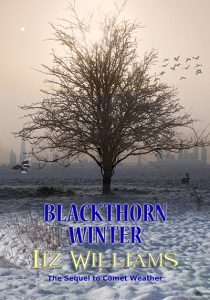 I wanted to ask you about Blackthorn Winter, because Comet Weather has a self-contained narrative. But obviously, it’s open enough at the end that there are more things that can happen. So when you originally wrote it, did you conceive it as a single novel by itself, or was it always part of a larger series?
I wanted to ask you about Blackthorn Winter, because Comet Weather has a self-contained narrative. But obviously, it’s open enough at the end that there are more things that can happen. So when you originally wrote it, did you conceive it as a single novel by itself, or was it always part of a larger series?
It was always part of a quartet. So there are going to be four books all in all, and I’m writing the third one, which is called Ember Tide now. The next one, which is going to be set partly in Cornwall, I know that much about it. And it’s more maritime, it’s about the sea. That’s called Salt on the Midnight Fire. So there are four books altogether. I always conceived that there would be four books, because it’s the four quarters of the year. I seem to be tied into this quartet thing all the time. Four sisters, four books. But it’s not like each book is going to focus on one particular sister. Although quite a lot of Blackthorn Winter does focus on Stella, and some new associations and some new people who are around on the London scene. But that too, has a self contained plot. So there’s an end to it. But then there are some loose ends which are going to be carried over into the next book.
Blackthorn Winter is coming out to end of this year, beginning of next year. Is the plan with the others to release one a year for the next couple of years?
I’d quite like to, yes, but Ian at Newcon has taken the first two but he hasn’t signed off on number three and number four. So as always, we’re going to have to see how those sell and how that goes before we can even say yes, but that would be a nice plan. He’s very good, he’s so quick with turn around. We wanted to get Blackthorn Winter out before Christmas, because it is a Christmas book. It’s set in the winter. Whereas Ember Tide is set in the spring. And Comet Weather was obviously set in the autumn. That’s where we’re going with it. We’ll just have to wait and see and hope that they sell well enough for him to take on the rest.
In particular, what can we expect from Blackthorn Winter?
So what you can expect from Blackthorn Winter is a lot of London resonances and London lore. And some of the people who appear in it are the movers and shakers on the London occult scene. There are late 19th century resonances. And there is some time travel, there is some stuff with the Roman world of London. And there’s also a lot of stuff with Luna, particularly on the Severn Estuary: the other side of the country, or the side of the Southwest. I’ve tried to balance it out. And eventually the two narratives are going to come together. But yes, lots of new people, hopefully interesting people. And me just playing around with the folklore really, and some of the occult lore of London, which is a fascinating city. I can’t really write a series of novels about the South of England and leave London out. That’s what I’ve been having a lot of fun with, and I managed to make a number of trips up to London this year, even with lockdown, to actually do some things and go and see some places and do some research. And a big trip to East Anglia as well – I came back through Suffolk, which I’ve very rarely visited before. I did a bit of research in places like Lowestoft, so you’ll be seeing some of that going into the novel as well.
As well as writing fantasy, you’ve also written a lot of science fiction in the past. How do you see your work in relation to genre? Do particular ideas present themselves, and this one’s better suited to a fantasy? And this one’s better suited to science fiction? Or is it more organic than that?
Yeah, that’s a really interesting question. Actually, I think it probably is more organic, in that I have an idea usually for the setting first. So that kind of determines whether it’s going to be SF or fantasy. But I’m really fond of the term science fantasy, which is a term that we don’t tend to use very much these days, but which definitely got applied to the people who influenced me like Le Guin and Jack Vance, in particular, when I was growing up reading in the 70s. A lot of that stuff, Roger Zelazny as well, was described as science fantasy, and it was kind of that crossover. It could be magic, it could be science. There’s no way that Comet Weather could be science fiction, but there is a way in which some of the Martian novels could – they verge on fantasy because the tech’s not really scientific. It’s kind of occult technology. And I think that, that in particular fits right into the science fantasy bracket, but it’s not really a term that gets used a lot these days. And that’s a shame because I want to have my cake and eat it. Fantasy and detective fiction and a lot of other stuff as well. You know, I don’t see why I shouldn’t – she said optimistically because publishers hate that because they can’t market it! They don’t know where to put it in the bookstore. So yeah, there’s so much to it.
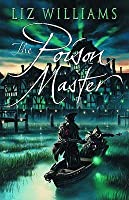 You have books like The Poison Master that’s again playing with the boundaries because you have all the John Dee stuff in there, but also the aliens on another planet…
You have books like The Poison Master that’s again playing with the boundaries because you have all the John Dee stuff in there, but also the aliens on another planet…
Yeah, that was really me consciously doing science fantasy. And I wanted to write about a Kabbalistic universe, which is what the literal universe in that is. It’s based on the Kabbalistic tree of life. I’m into the Kabbalah, to an extent, and it underpins a lot of my sort of occult thinking, and it was really fun to play around with that. I really enjoyed creating those worlds. I wouldn’t rule going back to that at some point. I thought that was a fun universe to play around. I like ideas really, I just like throwing ideas out there and the more ideas the better, and I like having fun with it.
You’ve talked about the the occult magic in the Martian books that influences the tech and then obviously the Kabbalah and The Poison Master. Are these elements where your paganism comes through and influences your approach to writing?
Yeah, definitely. My magical practice influences my approach to writing, and I have a great interest in the history of the occult in Britain and magic. Not just paganism as such, because magic and paganism are slightly different. You can be a pagan but not be into magic, or you can be a magician, but not into paganism, because there are Christian magicians. So it’s like the two of them are like DNA strands that work their way through British history. And the history of everywhere else, in fact, but my particular area of expertise is with the magical practice of Britain. And that definitely makes its way into the novels. Because I just find it interesting.
You’ve written both series and standalone novels. With all of these do you know when you’re writing the novel, this is part of the series or this one is a standalone? Or is it just something that when you come to the end of it, you feel actually I can do more with these characters or this setting?
Yeah, I think it’s more like the latter. The Poison Master is an iffy one, because I think I could go back and do more with that. Nine Layers of Sky was very definitely conceived as a single novel, so was Empire of Bones. Ghost Sister, I wasn’t really sure about. I thought I could do more in that universe, and later I did. So that was more of an organic thing. But I tend not to plan very far ahead in my career, I don’t think that you can, really. People sort of write what the mood takes them or what their publishers want to write sometimes. I come back to things later. And suddenly, an idea grabs me, and I think, oh, yeah, that could be fitted into that universe. I have radically fired off the serial numbers and swapped them around on occasion as well. Which is a nightmare. My poor agent, I’m sure I’m a nightmare to deal with. Because I have a lot of ideas, and I want to get those ideas out there. Sometimes I just kind of fling them out, regardless of whether they fit into a particular setting. I think this is probably a nightmare to market. But hey, you know, science fiction should be about stretching the envelope and so should fantasy. So we shouldn’t let ourselves be boxed if we don’t feel like it.
Nine Layers of Sky is an interesting one, I read online somewhere that it was influenced by your experience of living in Kazakhstan?
It is, yes, yeah, I went out to Kazakhstan in the mid 90s. I’d been working with the Kazakh government since the early 90s, because my previous job was in international education and we ran a scholarship program for the Kazakh government. And then I went out to Kazakhstan to work and live and spent the next few years sort of going back and forth between Britain and Central Asia. I don’t think I spent that long in Central Asia, it was kind of like a back and forth thing.
It’s a fascinating set of countries. I really found that the Russian approach is so different. They have their own set of myths about the future, what they wanted their country to become. Being a relatively new left wing, political system, a lot of those ideas were very, very idealistic, and were having to be grounded in the reality which wasn’t very amenable to them. And they kept changing. There are a lot of problems with Central Asian countries. But there were a lot of really good things as well. Kazakhstan was used for the Russian space program, because it’s really deserted. A lot of it is actual desert steppe. They could pretty much do what they liked out there without too much notice from the west. And obviously, they’ve got the room for the infrastructure, for the big rocket launching pads and so on. Although I read this afternoon that we are getting a spaceport in the north of Scotland apparently, which I find fascinating. It’s in The Guardian, it’s actually A’ Mhòine. It’s the peninsula overlooking Orkney. And the people up there have actually agreed that they can go ahead and build a spaceport. So you know, rocket launches like a mini Cape Canaveral. I find that fascinating. I think that’s probably one for Ken MacLeod. That’s not to stereotype poor Ken or anything. But he does do Scots really well, being one. So that will be fascinating.
These ideas get given to you on a plate. And you just think, Oh, my God, that would be fantastic to do something with that. So yeah, watch the space really. I might do something with that. I think everybody else will probably do something with that as well, actually!
As well as novels, you also have a couple of short story collections out with Newcon Press as well. Do you approach writing short stories differently than you do for writing novels?
I do. With creative writing students, I always use the analogy that when you’re writing short stories, it’s like moving all your furniture and all your stuff into a really small flat. And you don’t have the room for it. Writing novel is like moving all your storage stuff, and all your books and all your crap into a 25-room mansion. You’ve got a different set of problems, because the novel is so big. I’ve just started Ember Tide, and I’m literally ten pages in. And it just feels like there’s so much room. It’s actually really nice to feel like there’s a lot of space – psychic spaces, not real space, because I am doing it on a computer. With short stories, if you’ve got a 5000 word count limit, you’ve got to pack everything that you want to with into that form. So it’s really different. And they’re good challenges. Both of them. I actually really like writing short stories. But I like writing novels, too. It’s a very different animal.
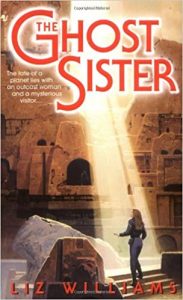 A lot of your novels are very complex. How do you go about setting up stories with so many moving parts?
A lot of your novels are very complex. How do you go about setting up stories with so many moving parts?
With difficulty actually. I’m not brilliant with plot and I do struggle with it, and sometimes it goes off the rails. Hopefully, I’ve learned how to kind of get it back onto the rails over the years. But it’s definitely not my forte. I think my forte is ideas, prose, hopefully character, hopefully dialogue, and world building. But plot, sometimes I feel it’s a little bit crunchy. So I do work it out beforehand. I’m not a total pantser as they say. You’re either a pantser or you plot, I’m kind of halfway between the two.
So with the Comet Weather novels, I am pantsing more than I normally do. But I do quite like to have at least a loose structure in place. Because otherwise the whole thing could just kind of disappear into something that makes sense to me, but makes sense to nobody else. I think sometimes I’m a bit over-complex. My agent said so, when I first started working with her. She kept saying, ‘you’ve got what I call transparent head syndrome, which is you know what’s going on, but you think that everybody else can see into your head and know what’s going on. They can’t’. I said yeah, that’s a fair cop. I do like complexity, and I like complex plots but I do try and simplify it a little bit more than I used to. Otherwise I just end up going, oh my god what’s happening here? And you don’t want that because your readers also end up going, oh my god what’s happening here?
As well as novels you’ve also published the two volumes of Diaries of a Witchcraft Shop with Trevor Jones. How does writing nonfiction differ from writing novels or short stories?
It depends on the nonfiction. The ones that we did with the witchcraft shop were really simple to do because they were basically my livejournal and our Facebook pages. So it’s all taken from that. With social media you’re basically writing a diary as you go along. So for the diary, we just tidy it up a bit. I think we streamlined it somewhat. There’s a bit of artistic license, in that we put two years into one year. So some of the events did not happen consecutively. But that’s all we did. Really, they were very easy to put together. I need to do number three, for Ian, and but I haven’t got around to that yet. But I do need to.
The other two that I’m doing that are nonfiction, one of them is out now, Miracles Of Our Own Making, which is the history of British magical practice and paganism. For that I had to bring in proper academic rigor. Which I’m okay with, because I have got an academic background. It wasn’t difficult, but I had to be really careful. I had to be thorough and meticulous and all of those things.
Then the last one at the moment, which we’re on to the editing stage of, is the book about handfastings, which are pagan weddings. That’s totally different, because I’ve never done anything like this before. I’m having to hack bits out of that, because I think the editor feels that it might be a little bit too complicated. It’s essentially a wedding guide. So all the history has had to go and some of the more interesting, to me, magical stuff has had to go. But I’m going to get it back in. They’re all very different projects, really. There’s the academic one, there’s the autobiographical stuff, and there’s the more popular, ‘how to’ guide. So yeah, that’s where we’re at, at the moment. I’m really lucky, I do get to do some really, really interesting stuff. I’m quite pleased about that. I felt very fortunate.
What are you working on at the moment? It sounds like you have a whole bunch of projects on the go.
Yeah, I’m doing other writing work, which is for a website. So that’s my kind of my paid work. That’s about expat stuff, which we don’t need to go into here because it’s real world, how to move when we’re in the middle of a pandemic type stuff. And then I’m editing the handfasting book. Some short stories in the planning stage. And I’m writing Ember Tide. So editing and writing.
Thank you Liz Williams for speaking with us!
Blackthorn Winter is expected on 19th January 2021 from Newcon Press and is
available for preorder now!
